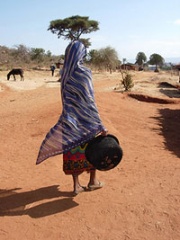MOTIVATION
Country development strategies link investment choices with development objectives supporting poverty reduction and economic growth. However, within many countries, policy choices are difficult because policymakers don’t have enough internal support to generate the information they need to make good decisions and prioritize investments. Within this context, IFPRI’s research aims to generate new knowledge, build local capacity, and create policy dialogues that support agricultural and rural growth and reduce poverty. IFPRI and its partners, including USAID, have developed Strategy Support Programs in Bangladesh, Democratic Republic of Congo, Ethiopia, Ghana, Malawi, Nigeria, Pakistan, and Uganda. Key outcomes from these Strategy Support Programs include:
OUTCOMES
- Bangladesh: Through the Bangladesh Policy Research and Strategy Support Program for Food Security and Agricultural Development, IFPRI contributes to the implementation of Bangladesh’s food security investment plan. In November 2012, IFPRI researchers worked with the Ministry of Agriculture to launch the Agricultural Policy Support Unit, which delivers real-time information to inform the decisionmaking process, such as information on the likely size of the next rice crop. The support program also conducted an evaluation of the Employment Generation Program for the Poorest, Bangladesh’s largest safety net program, and found that the program was highly successful, encouraging the government’s decision to renew the program for an additional term. The Bangladesh Integrated Household Survey, developed by IFPRI research staff in 2011, is the most comprehensive, nationally representative household survey conducted to date, providing useful data in an integrated format that allows users to answer a variety of research questions; moreover, a part of the survey has been designed to provide the baseline data for the USAID’s Feed the Future zone of influence, geographic areas that are strategically chosen based on need and strong potential for agriculture-led economic growth. Feed the Future tracks reductions in extreme poverty and stunting in these zones through baseline, midterm, and final population-based surveys conducted in these areas.
- Ethiopia:
- Since 2004, the Ethiopian government has relied heavily on IFPRI’s analysis to help design and implement its Agriculture-Led Industrialization Strategy. In addition, IFPRI worked with the Central Statistical Agency to create the 2007 Ethiopian Population and Housing Census Atlas, and provided analysis to the government’s Agricultural Growth Program.
- IFPRI’s research and technical support contributed to the launch of the Ethiopia Commodity Exchange, which generates market information for farmers.
- In 2013, an external evaluation of IFPRI’s work on Ethiopia’s Productive Safety Net Programme concluded that “Many interlocutors pointed to two related outcomes stemming from IFPRI’s contributions to the PSNP. First, IFPRI’s M&E has contributed strongly to improvements in the performance of the PSNP’s multiple sub-programs. These improvements have clearly conferred welfare gains on a large number of impoverished people by reducing food insecurity and increasing their accumulation of productive assets. IFPRI can justifiably claim a share of the credit for these results. Second, these successes have helped to secure continuing donor support for the PSNP, including the recent re-authorization of the program to which donors have committed a further US$ 2.3 billion for the years 2012–17.”
- Currently, IFPRI is providing technical research, capacity building, and policy communications support to Ethiopia’s Agricultural Transformation Agency (ATA).
- Ghana: IFPRI’s research contributed to making agricultural data on Ghana more widely available, and its collaboration with the Ministry of Agriculture and Ghana Statistical Service prompted the launch of a new round of the nationwide agricultural survey, which had not been conducted for more than three decades.
- Pakistan: IFPRI’s poverty data contributed to the Government of Pakistan setting up a task force to evaluate the Pakistan Bureau of Statistic's methods of calculating official poverty numbers, using IFPRI’s household surveys as a model. In 2011-2012, IFPRI’s research on wheat policy led to a reduction in the cost of government wheat procurement. Currently IFPRI is providing technical support to reduce the government’s subsidy costs, and the research is also extending to the provincial level. IFPRI’s review on the Pakistan Agricultural Research Council’s (PARC) role in agricultural research and extension activities has contributed to the development of PARC's five-year business plan and a key roadmap on how to manage changes after the devolution of government responsibilities from federal to provincial levels. In an effort to build local research capacity in Pakistan's academic community and policy-relevant social science research, IFPRI made small grants available to 37 projects, involving 59 investigators and co-investigators, along with master’s and PhD students. These projects address a wide range of issues, such as building vibrant markets and good governance.
- Uganda: IFPRI was invited by Uganda’s Plan for Modernization of Agriculture Secretariat to provide policy relevant research for the design and implementation of the agricultural and rural development strategy.



